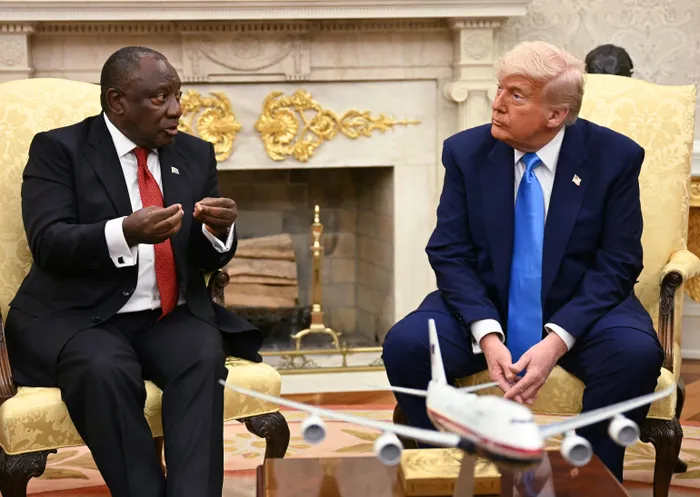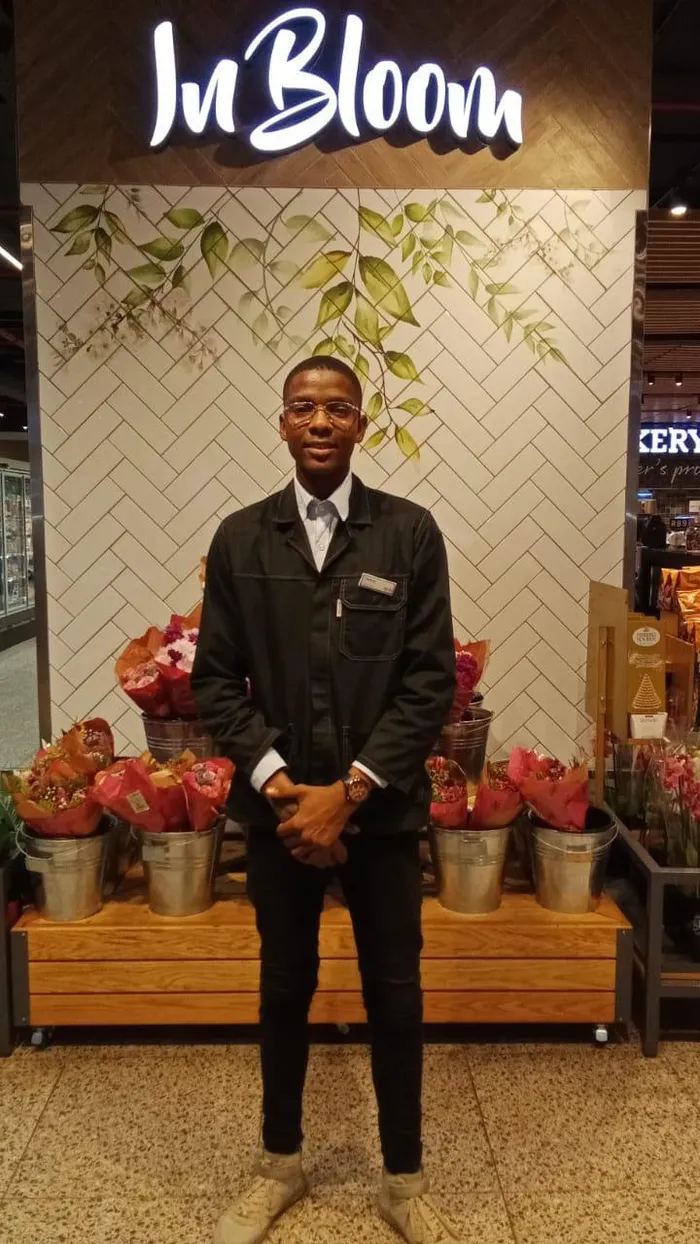Donald Trump is terribly wrong about white genocide, but he is right, things need to change in South Africa | Sihle Mlambo

US President Donald Trump meets with President Cyril Ramaphosa in the Oval Office of the White House in Washington, DC, on May 21, 2025. The leaders met amid tensions over Washington's resettlement of white Afrikaners that the US president claims are the victims of "genocide."
Image: JIM WATSON/AFP
Over 20,000 people were murdered in South Africa during the 2024/25 financial year. One of those 20,000 people murdered and killed in cold blood, was my 22-year-old brother, Ntokozo.
In just over a fortnight, it will be a year since those deadly bullets were fired at the back of his head on the evening of June 7, 2024, killing him along with two others - Kyle Abrahams and Jayden van der Byl - on the flat’s passageway of our Mayville home.
I remember where I was when I received a frantic call from my niece through an unknown number that evening, telling me “uNtokozo, bamdubulile ushonile (Ntokozo has been shot, he has died)”.
As the phone slammed shut in my ear I was stunned into silence, I did not say a single word, I was shell shocked and my body went cold, seconds later, I broke down, comforted by a stranger.
The pain my little brother's death caused and the nature of his death has caused to my family is truly unsettling, and I would not even wish it on my worst enemy.
I have watched my mother, my stepfather, my sisters, aunts struggle to come to terms with the reality of losing a son, a brother, a friend.
To this day, we still search for answers, healing and closure. The triple murder investigation docket into Ntokozo and his friends’ death was immediately reassigned to the Provincial Organized Crime Unit, which to my understanding, is located inside the office of Lieutenant General Nhlanhla Mkhwanazi.
The assigned investigating officer on the case, has never once reached out and spoken to my mother, or my stepfather, almost a year later.

My late brother, Ntokozo Aphiwe Gumede.
Image: Supplied
Ntokozo was a young black man with his whole life ahead of him, but like the pain my family feels, so do the families of the white farmers, the black farm workers, the Indian house robbery victims and all the victims of violent crimes, regardless of race.
Why am I telling you all of this? I suppose in some way because death is painful for all those who are involved and directly affected by it, including the 225 deadly farm attacks that have besieged the country in the past four years, never mind that over 100,000 have been killed in the same period.
From those 225, 55 killed farm owners (majority white), while the rest were farm labourers, International Relations Minister Ronald Lamola told CNN’s Christiane Amanpour on Thursday night.
“That does not represent genocide,” he asserted.
And the minister is correct, but, but once you start to look at death and murder as a human catastrophe and not as numbers, you start to feel the pain and suffering of those lives lost.
In some small way, we have become too accustomed at dismissing the white genocide narrative, but in so doing, we almost forget that there are still real lives lost, albeit at a far lesser scale than the AfriForum lobby and US President Donald Trump would have the world believe. It is important to be compassionate to those families, but of course there is no white genocide in South Africa, Trump knows that, Elon Musk knows that, and the rest of the PayPal Mafia gang too.
Deadly farm attacks have been happening in South Africa for years, because the farmers are isolated, it takes an awfully long time for help to arrive - they are essentially easier targets because of the vast acres of land they live in, isolating them.
This often gives the attackers more time to execute their devilish acts, in some instances, leading to rape and murder.
It is cruel and ghastly what happens to farmers and farmworkers during these farm attacks, and what Trump is perhaps correct about, is to ask the South African government what is to be done?
President Cyril Ramaphosa and his powerful delegation including Johann Rupert rightfully pointed out that there is a crime problem in South Africa, which is “across the board” and affects all races, Black African, Coloured, White and Indian, everyone.
The biggest victims of violent crime and murder in South Africa are Black African and Coloured men like my little brother, who don't have lobby groups and US dollar donations to spotlight their plight.
In some way, South Africa must shift the spotlight away from the fallacy of a white genocide, but it must really project manage and implement a viable and immediate turnkey strategy to combat crime and violent crime killing all people in South Africa, not just white farmers.
It is unacceptable that 25,000 young men, women and children of all races are murdered every year, something’s got to give.
Accepting this narrative of South Africa’s violent scourge does not mean that South Africa does not have a gender-based violence problem, we do, just as we have a problem with farm attacks.
South Africa has a crime problem period, and right now, what is needed, are urgent and tangible interventions that will directly begin to address the crime problem.
We heard Rupert speak and bid for Starlink technology at every police station, to which we were told billionaire Elon Musk - who has been driving the false white genocide narrative - was seen in the Oval Office nodding his head emphatically at every turn his company was mentioned as a solution.
But beyond Starlink, beyond the technological preventative measures that will be put in place, South Africa has an army of millions of unemployed youth who need to be economically active, before they too join the gangs and become a bigger problem for our communities in urban and rural settings.
The consequences of our growing unemployment and general youth despondency is why we are here. South Africa and its leaders have acknowledged the crime problem, now it is time to do something about it, open the factory floors, the warehouses, the assembly plants and tech spaces, get young people working!
For too long we have been warned that South Africa is a ticking time bomb, a country of two worlds.
In white South Africa, a small minority enjoy foods we can't pronounce, privatised hospitals, schools, shops, high walls, security and manicured lawns are staple, while in black South Africa, there are no jobs, poor public service, dilapidated schools, crime and hospitals.
With the systemic walls and barriers of Apartheid dismantled, white South Africa needs to realise that black South Africa’s problems, affect us all.
* Sihle Mlambo is a content manager at IOL.
